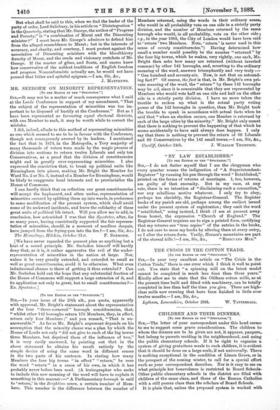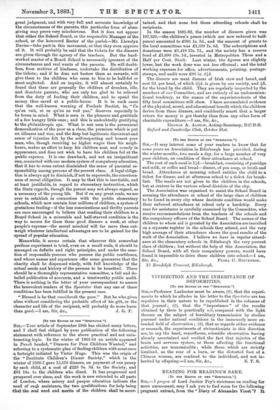CHILDREN AND THEIR DINNERS.
[To THE EDITOR OF TEE " SPECTATOR."] SIR,—The letter of your correspondent under this head seems= to me to suggest some grave considerations. The children to- whom the dinners are to be given are not, it appears, paupers, but belong to parents residing in the neighbourhood, and using the public elementary schools. If it be right to organise a. system of giving gratuitous meals to such children, it is evident. that it should be done on a large scale, if not universally. There- is nothing exceptional in the condition of Lisson Grove, or in the prospect of the coming winter, to call for a special effort such as your correspondent describes. Nor is it easy to see on what principle her benevolence is restricted to Board Schools. Other public elementary schools in the district are filled with children of the same class, and those of the Roman Catholics. with a still poorer class than the scholars of Board Schools.
It is plain that, unless the proposed system is worked with great judgment, and with very full and accurate knowledge of the circumstances of the parents, this particular form of alms- giving may prove very mischievous. But it does not appear that either the School Board, or the responsible Manager of the school, or the honoured Rector of the parish—Mr. Llewelyn Davies—take part in this movement, or that they even approve -of it. It will probably be said that the tickets for the dinners are given through the agency of the teachers. But the hard- -worked master of a Board School is necessarily ignorant of the circumstances and real wants of the parents. He will doubt- less, from motives of kindness, undertake the distribution of the tickets ; and if he does not bestow them as rewards, will give them to the children who seem to him to be half-fed or most neglected. And on inquiry, it will almost certainly be found that these are generally the children of drunken, idle, and dissolute parents, who are only too glad to be relieved from the duty of feeding their children, and to spend the money thus saved at a public-house. It is in such cases that the well-known warning of Frederic Bastiat, in, " Ce qu'on voit, et ce qu'on ne voit pas," deserves especially to be borne in mind. What is seen is the pleasure and gratitude of a few hungry little ones ; and this is undoubtedly gratifying to the philanthropic eye. What is not seen is the permanent -demoralisation of the poor as a class, the premium which is put on idleness and vice, and the deep but legitimate discontent and sense of injustice felt by the self-respecting and honest poor man, who, though receiving no higher wages than his neigh- bours, makes an effort to keep his children neat and comely in -appearance, and does not wish to have his children fed at the public expense. It is one drawback, and not an insignificant one, connected with our modern system of compulsory education, that it has to some extent diminished the sense of parental re- sponsibility among persons of the poorest class. A legal obliga- tion is always apt to diminish, if not to supersede, the conscious- ness of moral obligation. It may be that this is inevitable, and at least justifiable, in regard to elementary instruction, which the State regards, though the parent may not always regard, as a necessary of the young life. But if on any great scale, we are -ever to establish in connection with the public elementary :schools, which now contain four millions of children, a system of :gratuitous feeding—if the less conscientious and thrifty parents are once encouraged to believe that sending their children to a Board School in a miserable and hall-starved condition is the way to secure for them three good dinners a week, at other people's expense—the moral mischief will far more than out- weigh whatever intellectual advantages are to be gained for the spread of popular education.
Meanwhile, it seems certain that wherever this somewhat Perilous experiment is tried, even on a small scale, it should be managed on definite and right principles, and under the sanc- tion of responsible persons who possess the public confidence, and whose names and experience offer some guarantee that the -charity shall be dispensed wisely, with full knowledge of the actual needs and history of the persons to be benefited. There should be a thoroughly representative committee, a full and de- tailed publication of accounts, and a trustworthy pnblic audit.- "There is nothing in the letter of your correspondent to assure the benevolent readers of the Spectator that any one of these -conditions has been fulfilled in the present case.
"Blessed is he that considereth the poor." But he who gives alms without considering the probable effect of his gift, or the -character and life of the recipient, will probably do more harm







































 Previous page
Previous page